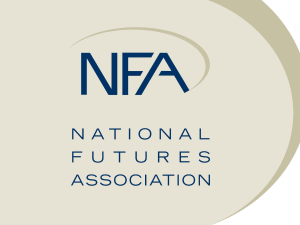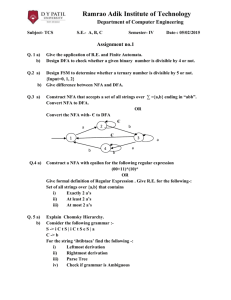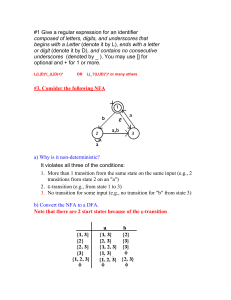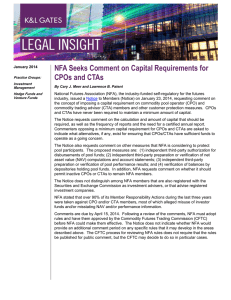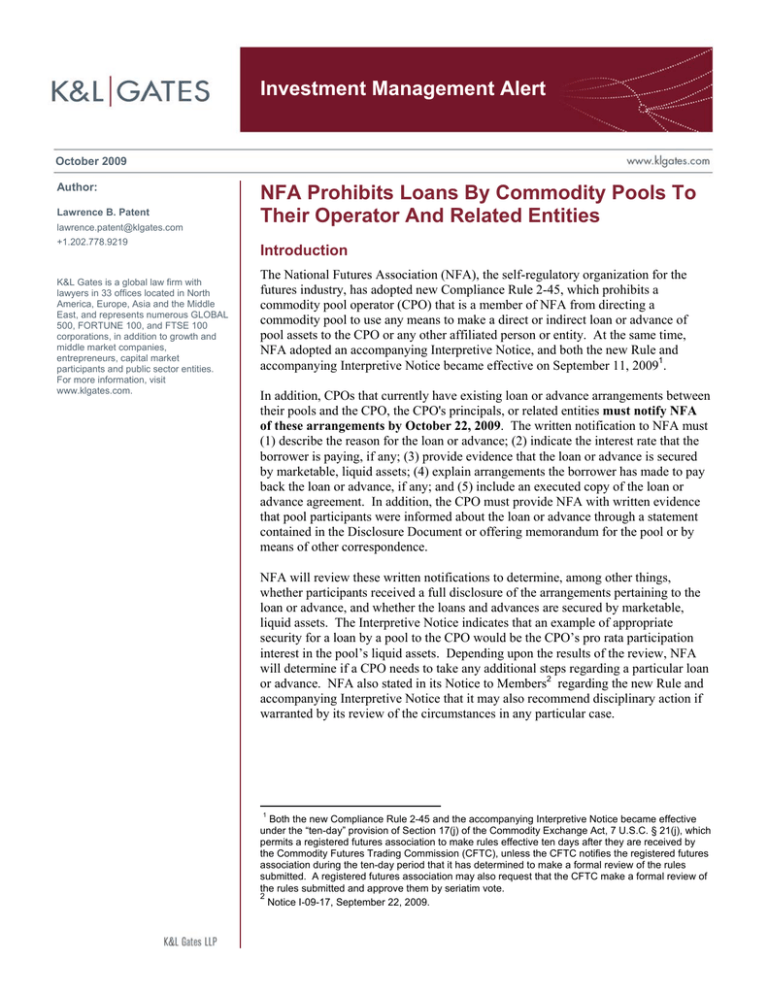
Investment Management Alert
October 2009
Author:
Lawrence B. Patent
lawrence.patent@klgates.com
+1.202.778.9219
K&L Gates is a global law firm with
lawyers in 33 offices located in North
America, Europe, Asia and the Middle
East, and represents numerous GLOBAL
500, FORTUNE 100, and FTSE 100
corporations, in addition to growth and
middle market companies,
entrepreneurs, capital market
participants and public sector entities.
For more information, visit
www.klgates.com.
NFA Prohibits Loans By Commodity Pools To
Their Operator And Related Entities
Introduction
The National Futures Association (NFA), the self-regulatory organization for the
futures industry, has adopted new Compliance Rule 2-45, which prohibits a
commodity pool operator (CPO) that is a member of NFA from directing a
commodity pool to use any means to make a direct or indirect loan or advance of
pool assets to the CPO or any other affiliated person or entity. At the same time,
NFA adopted an accompanying Interpretive Notice, and both the new Rule and
accompanying Interpretive Notice became effective on September 11, 20091.
In addition, CPOs that currently have existing loan or advance arrangements between
their pools and the CPO, the CPO's principals, or related entities must notify NFA
of these arrangements by October 22, 2009. The written notification to NFA must
(1) describe the reason for the loan or advance; (2) indicate the interest rate that the
borrower is paying, if any; (3) provide evidence that the loan or advance is secured
by marketable, liquid assets; (4) explain arrangements the borrower has made to pay
back the loan or advance, if any; and (5) include an executed copy of the loan or
advance agreement. In addition, the CPO must provide NFA with written evidence
that pool participants were informed about the loan or advance through a statement
contained in the Disclosure Document or offering memorandum for the pool or by
means of other correspondence.
NFA will review these written notifications to determine, among other things,
whether participants received a full disclosure of the arrangements pertaining to the
loan or advance, and whether the loans and advances are secured by marketable,
liquid assets. The Interpretive Notice indicates that an example of appropriate
security for a loan by a pool to the CPO would be the CPO’s pro rata participation
interest in the pool’s liquid assets. Depending upon the results of the review, NFA
will determine if a CPO needs to take any additional steps regarding a particular loan
or advance. NFA also stated in its Notice to Members2 regarding the new Rule and
accompanying Interpretive Notice that it may also recommend disciplinary action if
warranted by its review of the circumstances in any particular case.
1
Both the new Compliance Rule 2-45 and the accompanying Interpretive Notice became effective
under the “ten-day” provision of Section 17(j) of the Commodity Exchange Act, 7 U.S.C. § 21(j), which
permits a registered futures association to make rules effective ten days after they are received by
the Commodity Futures Trading Commission (CFTC), unless the CFTC notifies the registered futures
association during the ten-day period that it has determined to make a formal review of the rules
submitted. A registered futures association may also request that the CFTC make a formal review of
the rules submitted and approve them by seriatim vote.
2
Notice I-09-17, September 22, 2009.
Investment Management Alert
Application of the Rule
NFA may only apply its rules to its members, so the
prohibitions of new Compliance Rule 2-45 only
apply to NFA member CPOs. However, the
prohibition on making loans or advances to the CPO
and related entities applies to any pool that the NFA
member operates. Therefore, if a CPO registers as
such under the Commodity Exchange Act and
operates some pools under the relief granted by
CFTC Regulation 4.7,3 and some other pools are
operated in accordance with CFTC Regulation
4.13(a)(3) or (a)(4),4 the new NFA rule applies to
all of those pools. This is the case even though the
operation of pools in accordance with CFTC
Regulation 4.13(a)(3) or (a)(4), standing alone,
would not require the operator thereof to register as
a CPO or become an NFA member.
Most hedge fund managers that rely on the
exemptions in CFTC Regulation 4.13(a)(3) or (a)(4)
3
CFTC Regulation 4.7 provides a registered CPO with relief
from certain disclosure, recordkeeping and reporting
requirements that are otherwise applicable to a CPO, if the
CPO restricts its pool participants to what are defined as
“qualified eligible persons” (QEPs). QEPs include persons that
meet the “accredited investor” test under the securities laws
and also meet a portfolio requirement related to prior
investment experience, as well as certain investment
professionals, “qualified purchasers” under the Investment
Company Act of 1940 (ICA), “knowledgeable employees,” nonU.S. persons, and certain trusts and charitable organizations.
CFTC Regulations may be found in Title 17 of the Code of
Federal Regulations by the regulation number.
4
CFTC Regulation 4.13(a)(4) provides an exemption from
CPO registration if the pool operator limits the pool participants
to “supersophisticated” persons and operates a fund that is
exempt from the provisions of the ICA pursuant to ICA §
3(c)(7). Such a pool may engage in futures transactions
without limitation. Another exemption from registration, often
referred to as the “de minimis” exemption, is set forth in CFTC
Regulation 4.13(a)(3) and requires that no more than five
percent of the assets of a fund be committed to initial futures
margin or option premiums, or that the aggregate net notional
value of all commodity interest positions not exceed the
liquidation value of the fund. The participants in such a fund
are limited to “accredited investors” as defined in Securities
and Exchange Commission (SEC) regulations, trusts formed
by accredited investors for family members, and
“knowledgeable employees” of the fund as defined in SEC or
CFTC regulations, and the fund may not be marketed as a
vehicle for trading in the commodity futures or option markets.
To qualify for the exemption from registration as a CPO under
either CFTC Regulation 4.13(a)(3) or (a)(4), the interests in the
pool must be exempt from registration under the Securities Act
of 1933 and offered and sold without marketing to the public in
the United States.
can direct the funds that they operate to engage in
futures transactions in compliance with the
conditions in these Regulations regarding the
amount of futures trading or the level of
sophistication of the pool participants. If so, the
hedge fund operators do not need to register as
CPOs or become NFA members and new NFA
Compliance Rule 2-45 will not apply to them.
However, to the extent a manager operates some
pools for which it must be and is registered as a
CPO, and thus is required to be an NFA Member,
all of that operator's pools, even those operated in
accordance with CFTC Regulation 4.13(a)(3) or
(a)(4), are subject to the restrictions in new NFA
Compliance Rule 2-45.
If an NFA member is concerned about the impact of
the new rule, it may want to consider converting its
Regulation 4.7 pools, as well as any pools that it
operates in full compliance with Part 4 of the
CFTC’s regulations, to Regulation 4.13 pools, so
that it can de-register as a CPO and withdraw its
NFA membership. It may also want to consider
creating an affiliate that would not be subject to the
new rule to operate the Regulation 4.13 pools
separate and apart from Regulation 4.7 and fully
compliant pools.
NFA originally submitted Compliance Rule 2-45 to
the CFTC for formal approval in a letter dated May
27, 2009. In its Explanation of Proposed
Amendments included with the May submission,
NFA stated that it recognized that there are
circumstances where a carve-out to the prohibition
on loans and advances may be appropriate, such as
where a CPO permits participants, including a
pool’s general partner, to borrow against their
equity interest in the pool in lieu of making a
withdrawal, provided that the participant’s interest
in the pool is used to collateralize the loan. NFA
further stated that these types of situations are best
handled on a case-by-case basis, with the CPO
seeking a no-action letter from NFA.
When the CFTC staff reviewed the May
submission, they supported the overall framework
of the new Rule but expressed concerns regarding
October 2009
2
Investment Management Alert
NFA’s ability to grant no-action relief.5 Therefore,
although the text of NFA Compliance Rule 2-45 was
not changed, NFA resubmitted the Rule under the
“ten-day” provision in August, and discussed this
issue in the revised Explanation of Proposed
Amendments, stating that NFA’s Board had
reconsidered and withdrew its original position
regarding no-action relief. The revised Explanation
of Proposed Amendments further states that NFA’s
Board recognizes that there are some loan
arrangements in place that have been fully disclosed
and are adequately collateralized. The Interpretive
Notice that accompanies new Compliance Rule 2-45
provides that borrowers will not be required to
immediately sell other assets to repay these existing
loans, provided the notification about the loans is
made to NFA by October 22, 2009 as described
above.
Although NFA staff will not be providing any noaction letters concerning these activities, they may
be willing to discuss arrangements that could be
fully disclosed to pool participants, adequately
collateralized, and undertaken as arms-length
transactions, such as repurchase transactions with
numerous counterparties, some of which may be
related entities, but where any transactions with
related entities do not involve a substantial amount
of pool assets. CPOs contemplating any such
arrangements should consult with counsel about
approaching NFA staff for guidance. Of course, any
program involving only a related entity and a
substantial portion of the pool’s assets would
immediately raise red flags.6 CPOs may also have
included in their existing pools’ Disclosure
Documents or private placement memoranda
statements about the possibility of the pools making
loans or advances to the CPO or any other affiliated
5
This wariness towards no-action relief is consistent with
recent CFTC action revoking prior grants of no-action relief to
the operators of certain exchange-traded funds concerning
federal agricultural speculative trading limits (which may be
accessed through the CFTC website at
http://www.cftc.gov/newsroom/generalpressreleases/2009/pr5
695-09.html), as well as statements of CFTC Chairman
Gensler at his February 25, 2009, confirmation hearings, and
some current legislative proposals (see the “Derivatives
Markets Transparency and Accountability Act of 2009,” H.R.
977, § 8, which passed the House Committee on Agriculture
by voice vote on February 12, 2009), calling for review of the
no-action process.
6
See discussion, infra, of Stotler Funds, Inc.
person when describing related party transactions or
conflicts of interest.7 If no such transactions have
yet been entered into, it would be prudent for a CPO
to notify NFA staff immediately that these
provisions are set forth in the Disclosure Documents
or private placement memoranda and seek guidance
from NFA staff about how to address any possible
need to modify these disclosures.
Why NFA Adopted the Rule
NFA’s Explanation of Proposed Amendments
accompanying the filing with the CFTC of new
Compliance Rule 2-45 and the related Interpretive
Notice sets forth the NFA’s reasons for adopting the
new Rule. In February 2009, NFA brought two
Member Responsibility Actions (MRAs) against
three member CPOs.8 Although the basis of these
MRAs was the failure by the CPOs to cooperate
with NFA investigators, NFA stated that the limited
investigations that its staff was able to perform
indicated that the CPOs had misappropriated pool
assets through improper loans from pools to the
CPOs or related entities. NFA also noted that both
cases were the subject of CFTC charges of
misappropriation of pool assets through improper
loans, as well as criminal fraud charges. NFA
further noted that there have been similar instances
of CPOs misappropriating pool assets through direct
or indirect loans by a pool to the CPO or a related
entity in past years, and because such activity has
caused substantial losses to pool participants, direct
or indirect loans or advances from commodity pools
to the CPO or any affiliated person or entity should
be prohibited.
NFA’s new Compliance Rule 2-45 echoes a CFTC
proposal from almost two decades ago. In the wake
of the collapse of several commodity pools operated
by Stotler Funds, Inc., the CFTC charged that one of
the pools used approximately 80 percent of its assets
to purchase commercial paper of the CPO’s parent
7
See CFTC Regulation 4.24(j) and (k).
NFA 09MRA00001 against Mark Evan Bloom (Feb. 9,
2009), and NFA 09MRA00002 against Paul Greenwood and
Stephen Walsh (Feb. 12, 2009). MRAs are emergency
actions taken by NFA when it suspects that customer or pool
participant funds are in jeopardy, and the actions essentially
freeze the activities of the respondents and suspend their NFA
memberships. Respondents may request a prompt hearing
on the MRA.
8
October 2009
3
Investment Management Alert
company, and another pool used approximately 10
percent of its assets to make a loan to the same
parent company.9 On September 27, 1991, the
CFTC authorized for publication and public
comment a proposed Regulation 4.20(d) that would
have generally prohibited a CPO from knowingly
using the funds or property of a commodity pool that
it operates to purchase assets of or securities issued
by, or to lend money or other property to, such CPO
or an affiliated person of the CPO. Certain limited
exemptions would be provided, including an
exemption to allow a CPO to invest funds of a pool
it operates in certain affiliated money market
funds.10 When the CFTC announced that proposal,
it cited to similar recommendations made by the
CFTC’s Advisory Committee on Commodity
Futures Trading Professionals in the mid-1970s, but
also noted that the CFTC regulations to govern
CPOs generally adopted a regulatory approach of
disclosure rather than prohibitions or restrictions,
which was consistent with the overall thrust of the
Advisory Committee’s recommendations. In any
event, the CFTC never adopted proposed Regulation
4.20(d), withdrawing the proposal on December 16,
1992.11
Other Regulatory Frameworks
The prohibition in the new NFA Compliance Rule 245 is consistent with provisions in other regulatory
frameworks that address the potential conflict of
interest and self-dealing that could arise if persons
with access to funds of others were to use those
funds in transactions where those persons or their
affiliates would be interested parties. For example,
Section 17 of the ICA makes it unlawful for a
registered investment company to purchase
securities from or lend money to affiliated persons,
unless an exemptive order is granted by the SEC.12
Comptroller of the Currency regulations generally
prohibit a national bank from investing funds that it
holds as a fiduciary in stock or property acquired
from the bank, affiliates of the bank, or officers,
directors or employees of the bank or its affiliates,13
and Section 406(b)(1) of the Employee Retirement
Income Security Act of 1974 prohibits a fiduciary of
a pension plan from “deal[ing] with the assets of the
plan in his own interest or for his own account.” 14
Conclusion
As noted above, the CFTC approach to commodity
pools has generally been one of disclosure, rather
than prescriptions. Nonetheless, new NFA
Compliance Rule 2-45 adds to the list of prohibited
activities that are set forth in CFTC Regulation 4.20.
Any NFA member CPO that is operating pools with
outstanding loans or advances to the CPO or other
affiliated persons must notify NFA about these
arrangements by October 22, 2009, as described
above. If an NFA member CPO wants to avoid
application of NFA Compliance Rule 2-45, all pools
that it operates must be operated in accordance with
the provisions of CFTC Regulation 4.13, including
filing appropriate notices with NFA, so that the pool
operator is exempt from CPO registration and thus
not required to be an NFA member. If an NFA
member CPO believes that any arrangements
involving loans or advances by pools it operates to
the CPO or other affiliated persons or entities
should be permitted in the future, the CPO should
consult with counsel about approaching NFA staff
for guidance before any loans or advances are
entered into by the pool with the CPO or other
affiliated persons.
9
CFTC v. Stotler Funds, Inc., Civil Action No. 90 C 4387 (N.D.
Ill. July 31, 1990). The CFTC’s motion for summary judgment
was granted on October 2, 1991. [1990-1992 Transfer Binder]
Comm. Fut. L. Rep. (CCH) ¶ 25,141.
10
56 Fed. Reg. 50067 (October 3, 1991).
11
See CFTC October 1993 Regulatory Flexibility Agenda, 58
Fed. Reg. 57260 (Oct. 25, 1993).
12
15 U.S.C. § 80a-17(a) and (b).
13
14
12 C.F.R. § 9.12.
29 U.S.C. § 1106(b)(1).
October 2009
4
Investment Management Alert
Anchorage Austin Beijing Berlin Boston Charlotte Chicago Dallas Dubai Fort Worth Frankfurt Harrisburg Hong Kong London
Los Angeles Miami Newark New York Orange County Palo Alto Paris Pittsburgh Portland Raleigh Research Triangle Park
San Diego San Francisco Seattle Shanghai Singapore Spokane/Coeur d’Alene Taipei Washington, D.C.
K&L Gates is a global law firm with lawyers in 33 offices located in North America, Europe, Asia and the Middle East, and represents numerous
GLOBAL 500, FORTUNE 100, and FTSE 100 corporations, in addition to growth and middle market companies, entrepreneurs, capital market
participants and public sector entities. For more information, visit www.klgates.com.
K&L Gates comprises multiple affiliated partnerships: a limited liability partnership with the full name K&L Gates LLP qualified in Delaware and
maintaining offices throughout the United States, in Berlin and Frankfurt, Germany, in Beijing (K&L Gates LLP Beijing Representative Office), in
Dubai, U.A.E., in Shanghai (K&L Gates LLP Shanghai Representative Office), and in Singapore; a limited liability partnership (also named K&L
Gates LLP) incorporated in England and maintaining offices in London and Paris; a Taiwan general partnership (K&L Gates) maintaining an office in
Taipei; and a Hong Kong general partnership (K&L Gates, Solicitors) maintaining an office in Hong Kong. K&L Gates maintains appropriate
registrations in the jurisdictions in which its offices are located. A list of the partners in each entity is available for inspection at any K&L Gates office.
This publication is for informational purposes and does not contain or convey legal advice. The information herein should not be used or relied upon
in regard to any particular facts or circumstances without first consulting a lawyer.
©2009 K&L Gates LLP. All Rights Reserved.
October 2009
5

